Fleurs du Mal Magazine


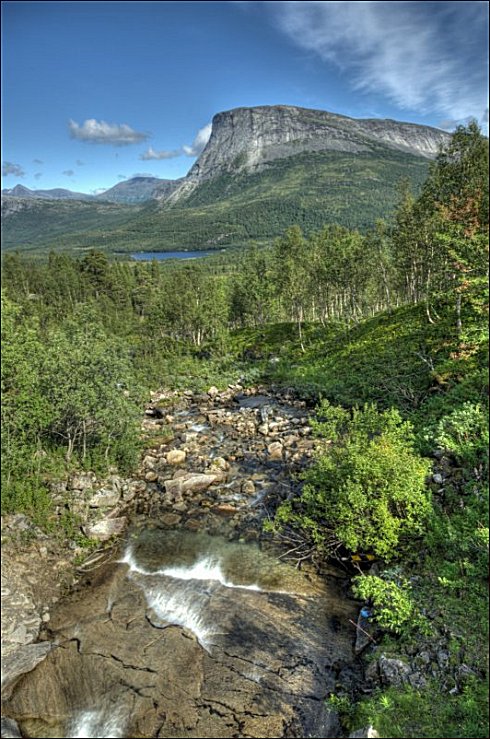
Johann Wolfgang von Goethe
(1749-1832)
Natur und Kunst
Natur und Kunst, sie scheinen sich zu fliehen,
Und haben sich, eh’ man es denkt, gefunden;
Der Widerwille ist auch mir verschwunden,
Und beide scheinen gleich mich anzuziehen.
Es gilt wohl nur ein redliches Bemühen!
Und wenn wir erst in abgemeßnen Stunden;
Mit Geist und Fleiß uns an die Kunst gebunden,
Mag frei Natur im Herzen wieder glühen.
So ist’s mit aller Bildung auch beschaffen:
Vergebens werden ungebundne Geister
Nach der Vollendung reiner Höhe streben.
Wer Großes will, muß sich zusammenraffen:
In der Beschränkung zeigt sich erst der Meister,
Und das Gesetz nur kann uns Freiheit geben.
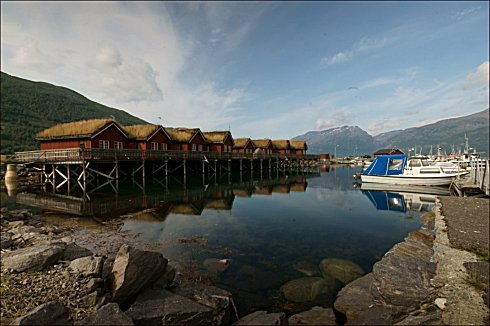
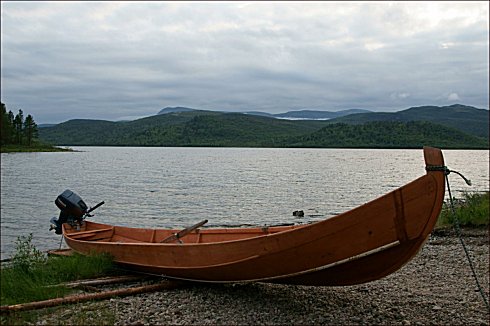
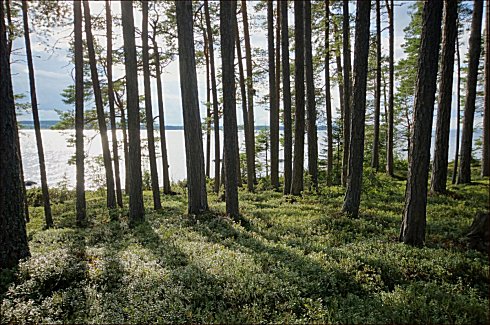
Hans Hermans photos – Natuurdagboek 12-11
Gedicht Johann Wolfgang von Goethe
kempis.nl poetry magazine
More in: Archive G-H, Goethe, Johann Wolfgang von, Hans Hermans Photos

William Shakespeare
(1564-1616)
THE SONNETS
114
Or whether doth my mind being crowned with you
Drink up the monarch’s plague this flattery?
Or whether shall I say mine eye saith true,
And that your love taught it this alchemy?
To make of monsters, and things indigest,
Such cherubins as your sweet self resemble,
Creating every bad a perfect best
As fast as objects to his beams assemble:
O ’tis the first, ’tis flattery in my seeing,
And my great mind most kingly drinks it up,
Mine eye well knows what with his gust is ‘greeing,
And to his palate doth prepare the cup.
If it be poisoned, ’tis the lesser sin,
That mine eye loves it and doth first begin.
![]()
kempis.nl poetry magazine
More in: -Shakespeare Sonnets

John Milton
On Time
Fly envious Time, till thou run out thy race,
Call on the lazy leaden-stepping hours,
Whose speed is but the heavy plummets pace;
And glut thy self with what thy womb devours,
Which is no more than what is false and vain,
And merely mortal dross,
So little is our loss,
So little is thy gain;
For when as each thing bad thou hast entombed,
And last of all, thy greedy self consumed,
Then long Eternity shall greet our bliss
With an individual kiss,
And Joy shall overtake us as a flood;
When every thing that is sincerely good
And perfectly divine
With Truth, and Peace, and Love shall ever shine
About the supreme throne
Of him, to whose happy-making sight alone,
When once our heavenly-guided soul shall climb,
Then, all this earthy grossness quit,
Attired with stars we shall for ever sit,
Triumphing over Death, and Chance, and thee O Time.
John Milton
Op de Tijd
Vlieg Tijd, jaloers, tot waar je landing ligt,
Spoor loden uren en hun luie stappen aan
Met slechts de valkracht van hun zwaar gewicht;
Zwelg, en verslind wat door je buik kan gaan,
Al is ’t niet meer dan valsheid zonder zin,
Verderfelijk slechts en vies:
Zo klein is ons verlies,
Zo klein is jouw gewin;
Want als jij al het kwade hebt verdelgd,
En dan tot slot je gulzige zelf verzwelgt,
Dan zegent ons de eeuwigdurendheid
Met ’n kus elk toebereid,
En overspoelt ons vreugde als een vloed;
Als alles wat waarachtig is en goed
En opperst goddelijk
Steeds straalt in waarheid, vredig, liefderijk
Rondom de hoogste troon
Van Hem, wiens zaligmakende betoon
Eens onze ziel ten hemel begeleidt,
Dan zetelen wij, alle aardse grofheid kwijt,
Getooid met sterren in de eeuwigheid,
Met zeges op de Dood, het Lot en jou, O Tijd.
Vertaling; Cornelis W. Schoneveld (2012)
kempis.nl poetry magazine
More in: Archive M-N, Milton, John, More translations

L.A. Raeven, Mindless Living, 2011, video still. Courtesy Ellen de Bruijne Projects Amsterdam
Casino Luxembourg – Forum d’art contemporain
L.A. Raeven – Ideal Individuals
28 January 2012 – 22 April 2012
Twin sisters Liesbeth and Angelique Raeven (*1971, Heerlen, Netherlands; live and work in Amsterdam) began their artistic collaboration under the generic name of L.A. Raeven in 1999. Their work rests on investigations surrounding the notion of “the ideal individual”, which they analyse through videos, drawings, installations and performances. L.A. Raeven study the status of the body and body image within western societies and the inherent social pressures. Adopting a critical attitude towards fashion and media dictates, they defy traditional representations of feminine beauty by integrating the codes of this same society to better lay them bare. Through doing this, a debate vis-a-vis the questions related to ideal body image and its social construction, within various cultural and historical contexts, is set up.
The exhibition was formerly shown in the Museum voor Moderne Kunst Arnhem and in the Museum of Contemporary Art in Belgrade. Curator: Kevin Muhlen
Casino Luxembourg – Forum d’art contemporain – 41, rue Notre-Dame | B.P. 345 | L-2013 Luxembourg
≡ Website CASINO LUXEMBOURG- FORUM D’ART CONTEMPORAIN, LUXEMBOURG
fleursdumal.nl magazine
More in: Art & Literature News, Art Criticism, Exhibition Archive, L.A. Raeven, Performing arts
![]()
Poolse dichteres Wislawa Szymborska overleden
2 feb 2012
Gisteren is de Poolse dichteres Wislawa Szymborska op 88-jarige leeftijd overleden. Szymborska won in 1996 de Nobelprijs voor de Literatuur. De juryleden van de Nobelprijs noemden de dichteres de ‘Mozart van de poëzie’.
Volgens haar woordvoerder is de dichteres ‘vredig, in haar slaap, overleden’. Ze woonde in de Zuid-Poolse stad Krakau.
Szymborska, geboren in 1923 in Kornik bij Poznan, studeerde letterkunde en sociologie in Krakau. Haar eerste gedichten publiceerde ze in 1945. De gedichten van Szymborska zijn zowel politiek als speels en geven blijk van een groot gevoel voor humor.
Wislawa Szymborska heeft een klein (niet meer dan 350 gedichten) maar geniaal oeuvre nagelaten.
Een titel hoeft niet
Hier zit ik dan onder een boom
aan de oever van een rivier,
op een zonnige morgen.
Een nietige gebeurtenis
die niet de geschiedenis ingaat.
Het zijn geen veldslagen en pacten
waarvan de motieven worden onderzocht,
of gedenkwaardige tirannenmoorden.
Toch zit ik aan de rivier, dat is een feit.
En nu ik hier ben,
moet ik ergens vandaan zijn gekomen
en daarvoor
op nog vele andere plaatsen zijn geweest,
net zoals veroveraars van landen
voor ze aan boord gingen.
Zelfs een vluchtig ogenblik heeft een rijk verleden,
een vrijdag voor een zaterdag,
een mei die aan juni voorafging.
Het heeft zijn eigen horizons,
even werkelijk als in de veldkijkers van bevelhebbers.
De boom is een populier die hier al jaren wortelt.
De rivier is de Raba die langer stroomt dan vandaag.
Het paadje is niet eergisteren pas
door de struiken gebaand.
Om die wolken te kunnen verjagen,
moet de wind ze eerst hierheen hebben gewaaid.
En hoewel in de buurt niets groots gebeurt,
is de wereld daardoor nog niet armer aan details,
niet minder gefundeerd, niet zwakker gedefinieerd
dan toen volksverhuizingen haar in hun greep hielden.
Niet alleen geheime komplotten worden in stilte gehuld,
niet alleen kroningen gaan van een gevolg van oorzaken vergezeld.
Rond kunnen niet alleen de jubilea van opstanden zijn,
maar ook de omspoelde steentjes aan de waterkant.
Dicht en verstrengeld is het borduursel van de omstandigheden.
De steken van de mier in het gras.
Het gras dat aan de aarde is genaaid.
Het golfpatroon waardoor een twijgje wordt geregen.
Het is zo gegaan dat ik hier ben en kijk.
Boven me fladdert een witte vlinder in de lucht
met vleugeltjes die alleen van hem zijn
en over mijn handen vliegt zijn schaduw,
geen andere, niet zomaar een, alleen de zijne.
Wanneer ik zoiets zie, verlaat me altijd de zekerheid
dat wat belangrijk is
belangrijker is dan wat onbelangrijk is.
Wislawa Szymborska (1923-2012)
(vertaling Gerard Rasch)
fleursdumal.nl magazine
More in: Archive Y-Z, In Memoriam
Ik heb een brede desinteresse!
(Henk & Ingrid)
http://www.henkeningrid.org/
More in: MUSEUM OF PUBLIC PROTEST, The talk of the town
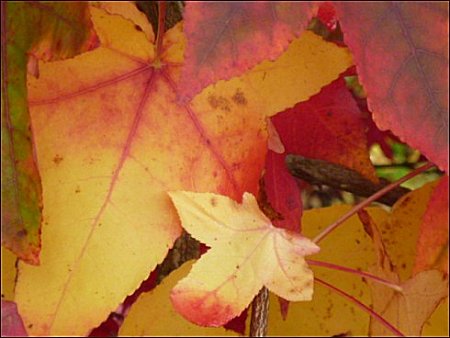

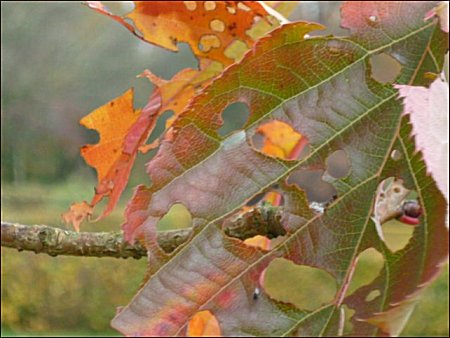
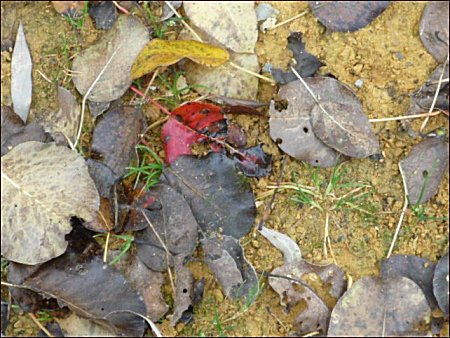
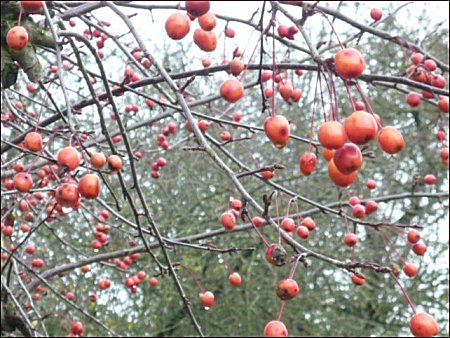
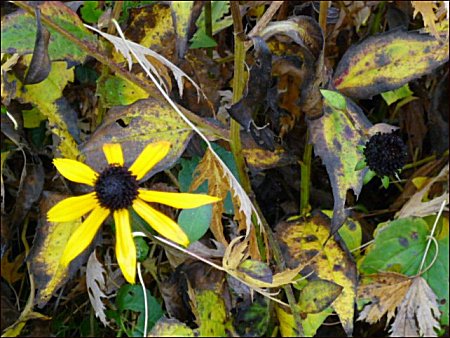
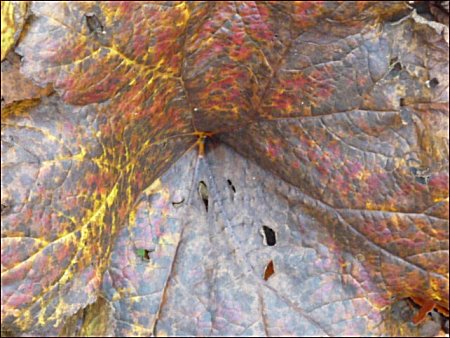
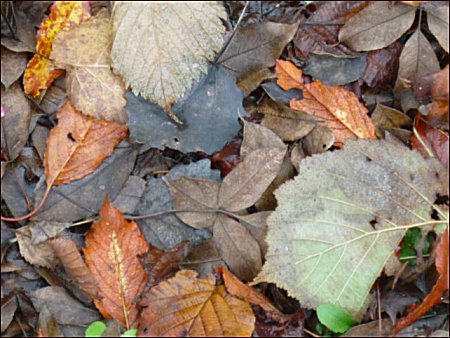
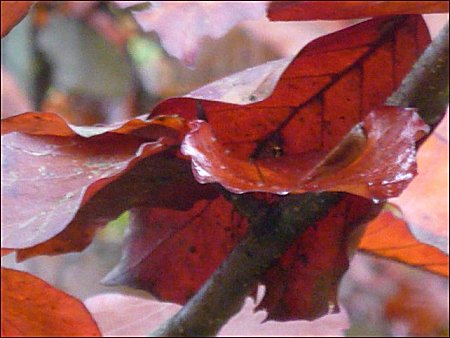

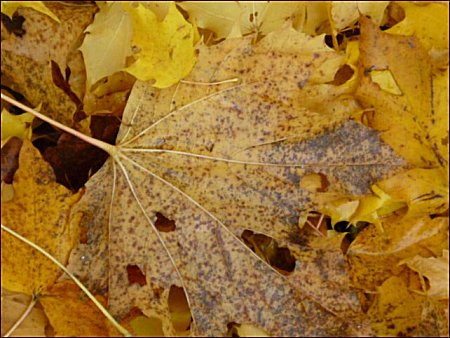

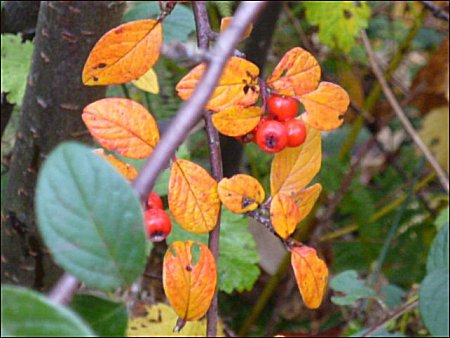
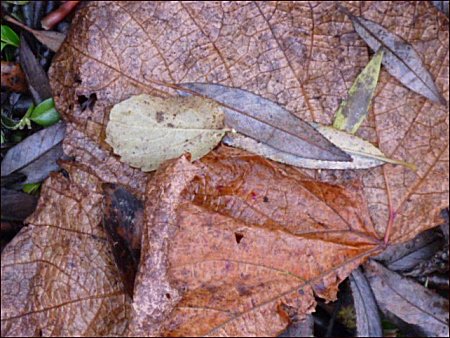
Freda Kamphuis photos
Colours (1)
©fredakamphuis 2011
kempis.nl poetry magazine
More in: Freda Kamphuis, Kamphuis, Freda

Ton van Reen
spitsuur
Een sirene jankt
en de dag
spat open
fabrieken lopen leeg
schoorstenen wuiven
de arbeiders na
auto’s spelen van
wie komt er in mijn hokje
langzaam lopend
in een rijtje
behangen ze de lucht
met hun ratelend hart
op hoge benen
lopen meisjes voorbij
ongemerkt halen ze
tussen zwoele wanden van ogen
de avond binnen
Uit: Ton van Reen, Blijvend vers, Verzamelde gedichten (1965-2007). Uitgeverij De Contrabas, 2011, ISBN 9789079432462, 144 pagina’s, paperback
kempis.nl poetry magazine
More in: Archive Q-R, Reen, Ton van

Bookshop Shakespeare and Company in Paris
Death of George Whitman
On Wednesday 14th December, 2011, George Whitman died peacefully at home in the apartment above his bookshop, Shakespeare and Company, in Paris. George suffered a stroke two months ago, but showed incredible strength and determination up to the end, continuing to read every day in the company of his daughter, Sylvia, his friends and his cat and dog. He died two days after his 98th birthday.
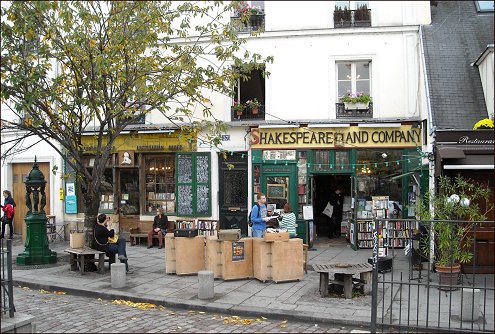
George Whitman was born on December 12, 1913 to mother Grace Bates and father Walter George Whitman in East Orange, New Jersey. When George was still a baby the family moved to Salem, Massachusetts. Early in his life George’s parents instilled in him a passionate and profound respect for literature. Walter was a well-respected professor of physics and the author of several books on science in the home and community. In 1925, when George was twelve years old, Walter took the whole family (except the youngest son Carl) on a year-long sabbatical to Nanking University in China. Immersed in Chinese culture and society, George and his younger sister Mary learned the language quite quickly. It was his first trip abroad, and his experiences in China made a lasting impression on him.
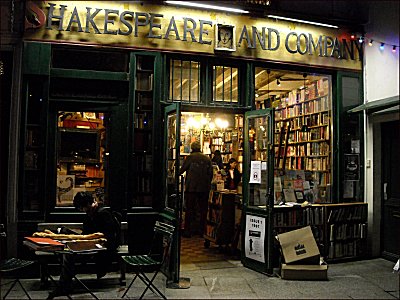
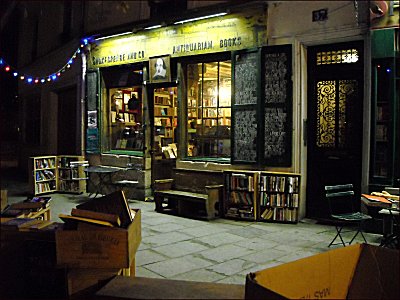
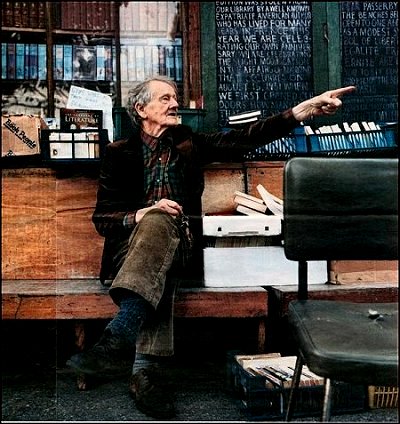
George Whitman
With the brief exception of the Nanking exchange, George lived in Salem until he graduated from high school. While he was a student he published and edited his own satirical paper called “The Reflector” and also worked as a newsboy. In 1931 George decided to enroll as an undergraduate at Boston University with a major in journalism. After his graduation in 1935 he decided to travel again. With $40 in his pocket he caught a ride to Mexico city and began a voyage that was to trace almost 5000 kilometers through Mexico and Central America, including the Honduras, Guatemala, Costa Rica, and Hawaii. During this time he became fluent in Spanish.
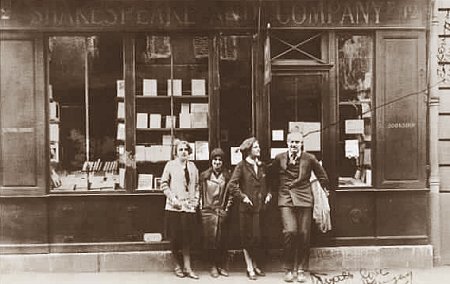
Ernest Hemingway (right)
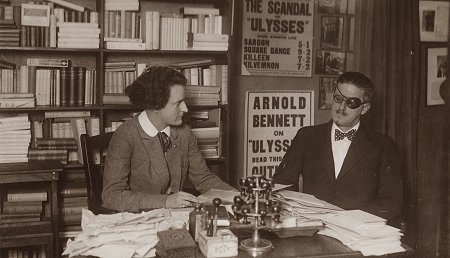
Sylvia Beach and James Joyce
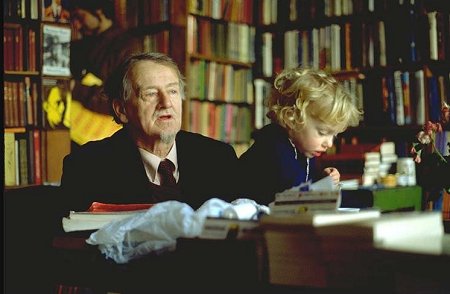
George Whitman and daughter Sylvia
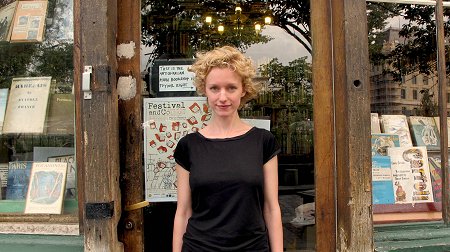
Sylvia Whitman
This trip was a formative experience in George’s life. Much of his traveling was done alone and on foot. He had many adventures and close calls. In an isolated part of the Yucatan he fell sick with dysentery and was forced to walk alone for three days through the swampy jungle with no food or water. Eventually he was found and nursed back to health by a tribe of Mayans. George was deeply impressed by the fact that despite hardship and extreme poverty, the people he met were invariably friendly and generous. This philosophy of “give what you can, take what you need” would become one of his founding principles.
When he arrived in Panama George ran out of money. He found a job working with the Panama Canal Company, where he stayed for several months before sailing to Hawaii and then to San Francisco in 1938, where he worked as a cable car conductor, attended classes at the University of California and enlisted in the US Army. He didn’t stay out west for long but decided to hobo his way back east, riding the rails until he arrived back in Massachussets. In 1939 he enrolled at Harvard University, where he stayed until 1941 when he was called into military service. He was trained as a Medical Warrant Officer and worked at different hospitals around Europe, helping with the wounded. Several months of his army career were spent at an isolated post in Greenland. He lived with the natives, learned to sail, and according to George, had a beautiful Eskimo girlfriend.
Returning to the United States, George managed to open and run a small bookstore in Taunton, Massachusetts while still working night shifts for the army until the war ended and he was discharged. After more travels through western Europe and France, George moved permanently to Paris in 1948 under the GI Bill. He lived in a small room in the Hotel Suez on Boulevard St. Michel in the heart of the Left Bank and enrolled at the Sorbonne, studying French civilization, philosophy, culture, and literature. Encouraged by his great friend Lawrence Lawrence Ferlinghetti, George founded his bookshop, Le Mistral, at 37 rue de la Bûcherie in 1951. The name, he says, “was in honour of the first girl I ever fell in love with.” Inspired by his encounters with the legendary bookseller Sylvia Beach, he later changed the name of his shop to Shakespeare and Company. In 1981 George’s only daughter was born at the Hôtel Dieu, directly across the Seine from the bookshop. She was respectfully named after Sylvia Beach.

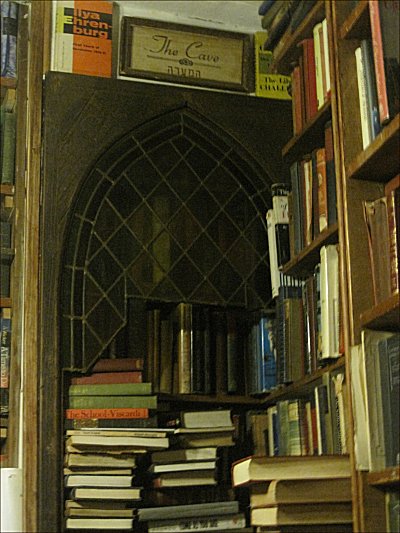
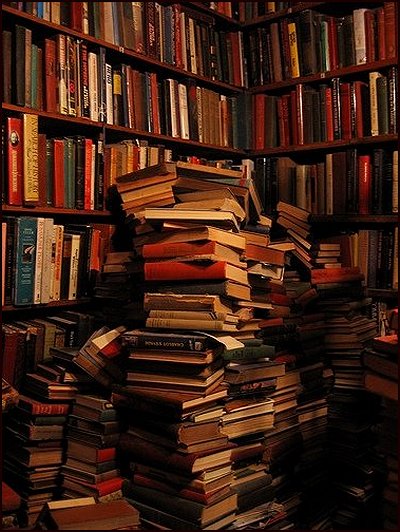

For 60 years George worked tirelessly to ensure that Shakespeare and Company remains not only a venerable independent bookshop, but also a renowned Left Bank cultural institution and a home-away-from-home for many thousands of writers and visitors from around the world. In 2006 he was awarded the Officier des Arts et Lettres by the French Minister of Culture for his lifelong contribution to the arts.
On Wednesday 14th December, 2011, George Whitman died at home in the apartment above his bookshop, Shakespeare and Company, in Paris. George suffered a stroke two months before, but showed incredible strength and determination up to the end, continuing to read every day in the company of his daughter, Sylvia, his friends and his cat and dog. He died two days after his 98th birthday.
After a life entirely dedicated to books, authors and readers, George will be sorely missed by all his loved ones and by bibliophiles around the world who have read, written and stayed in his bookshop for over 60 years. Nicknamed the Don Quixote of the Latin Quarter, George will be remembered for his free spirit, his eccentricity and his generosity – all three summarised in the verses written on the walls of his open, much-visited library : “Be not inhospitable to strangers / Lest they be angels in disguise.”
George was buried at the Père Lachaise cemetery in Paris, in the good company of other men and women of letters such as Guillaume Apollinaire, Colette, Oscar Wilde and Balzac. His bookstore continues, run by his daughter Sylvia.
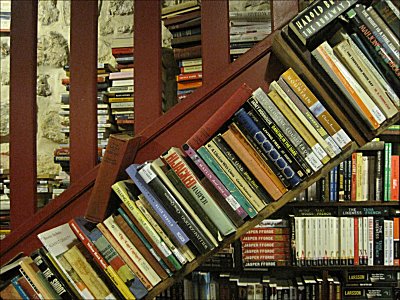
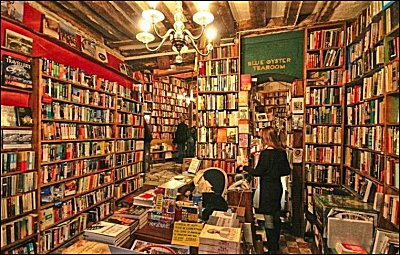
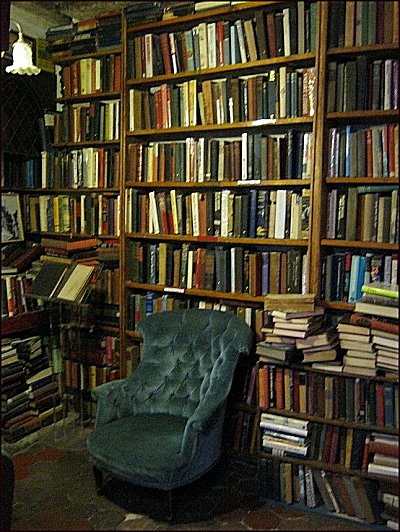

Shakespeare and Company, 37 Rue Bûcherie, 75005 Paris, France
photos 1-3 jef van kempen + photos archive shakespeare & company
≡ Website Shakespeare & Company Paris
Books. The final chapter?
kempis.nl poetry magazine
More in: - Bookstores, FDM in Paris
Thank you for reading Fleurs du Mal - magazine for art & literature